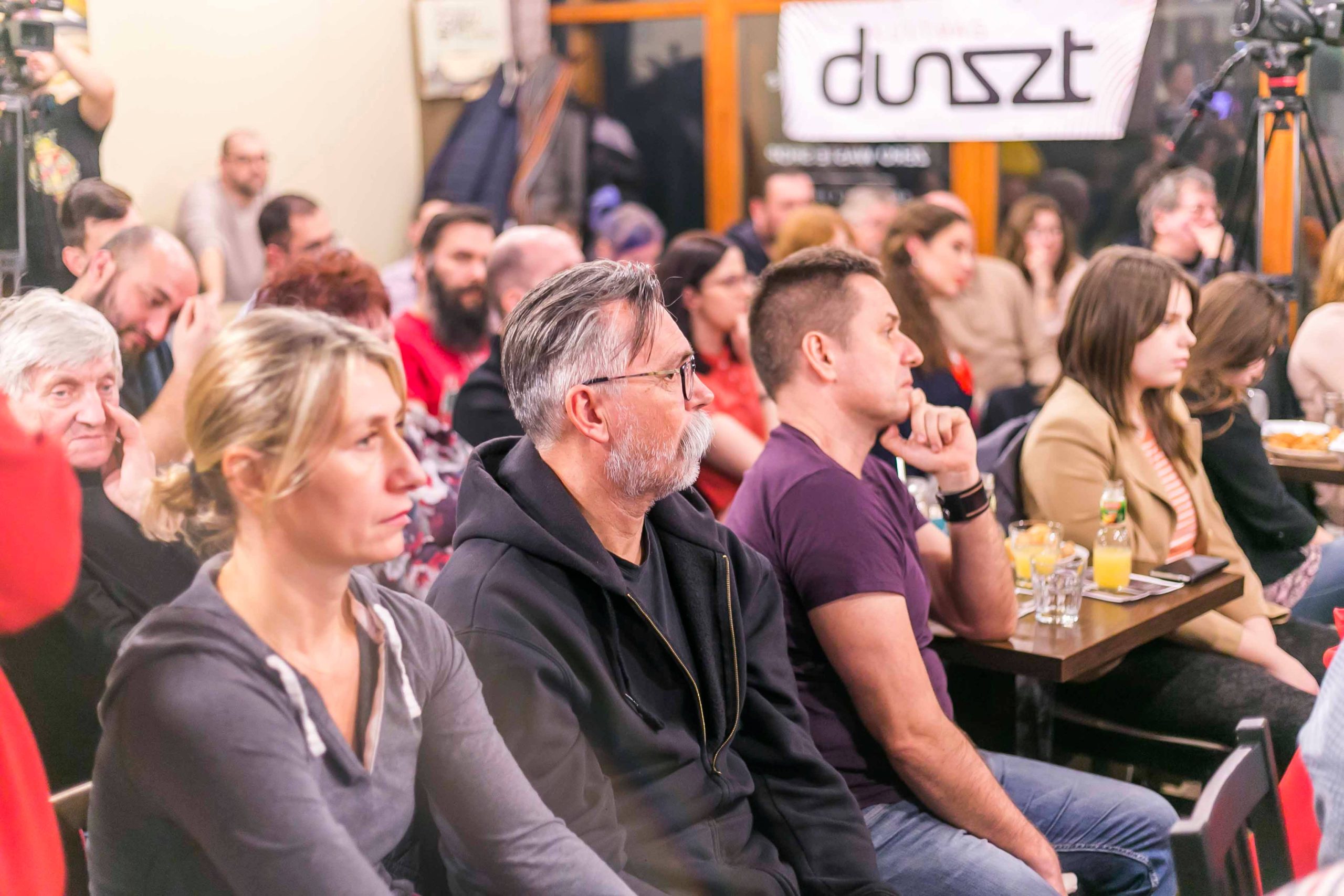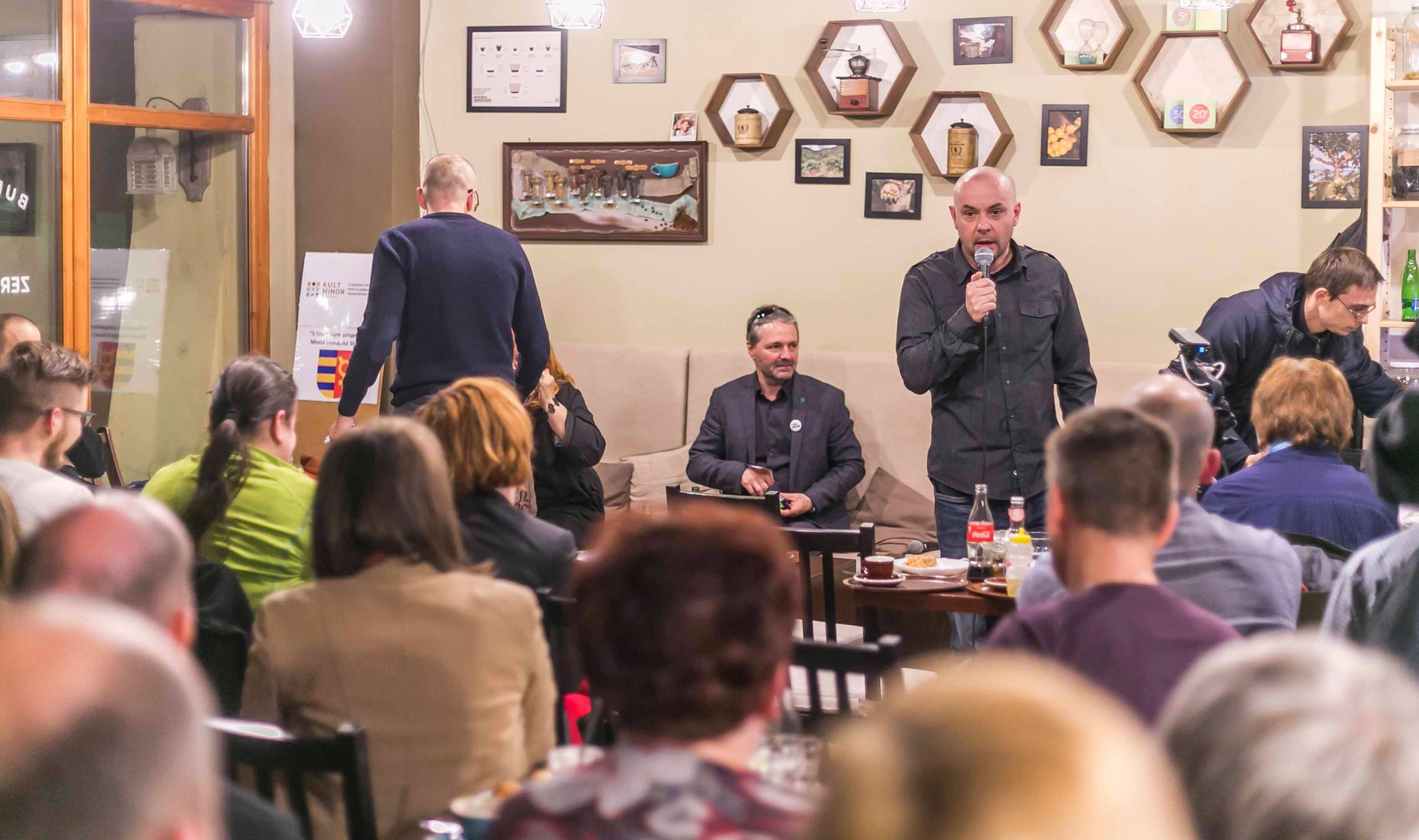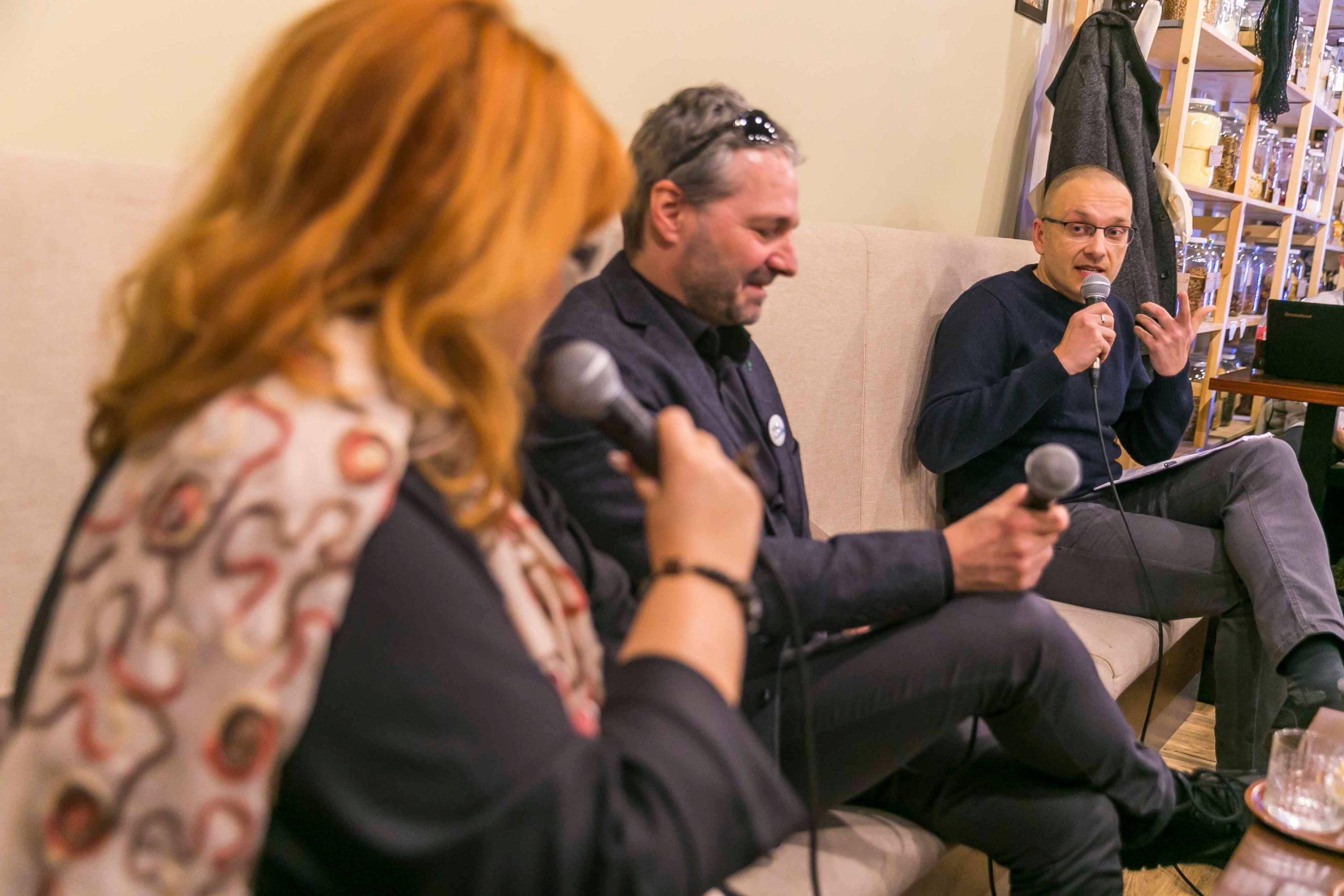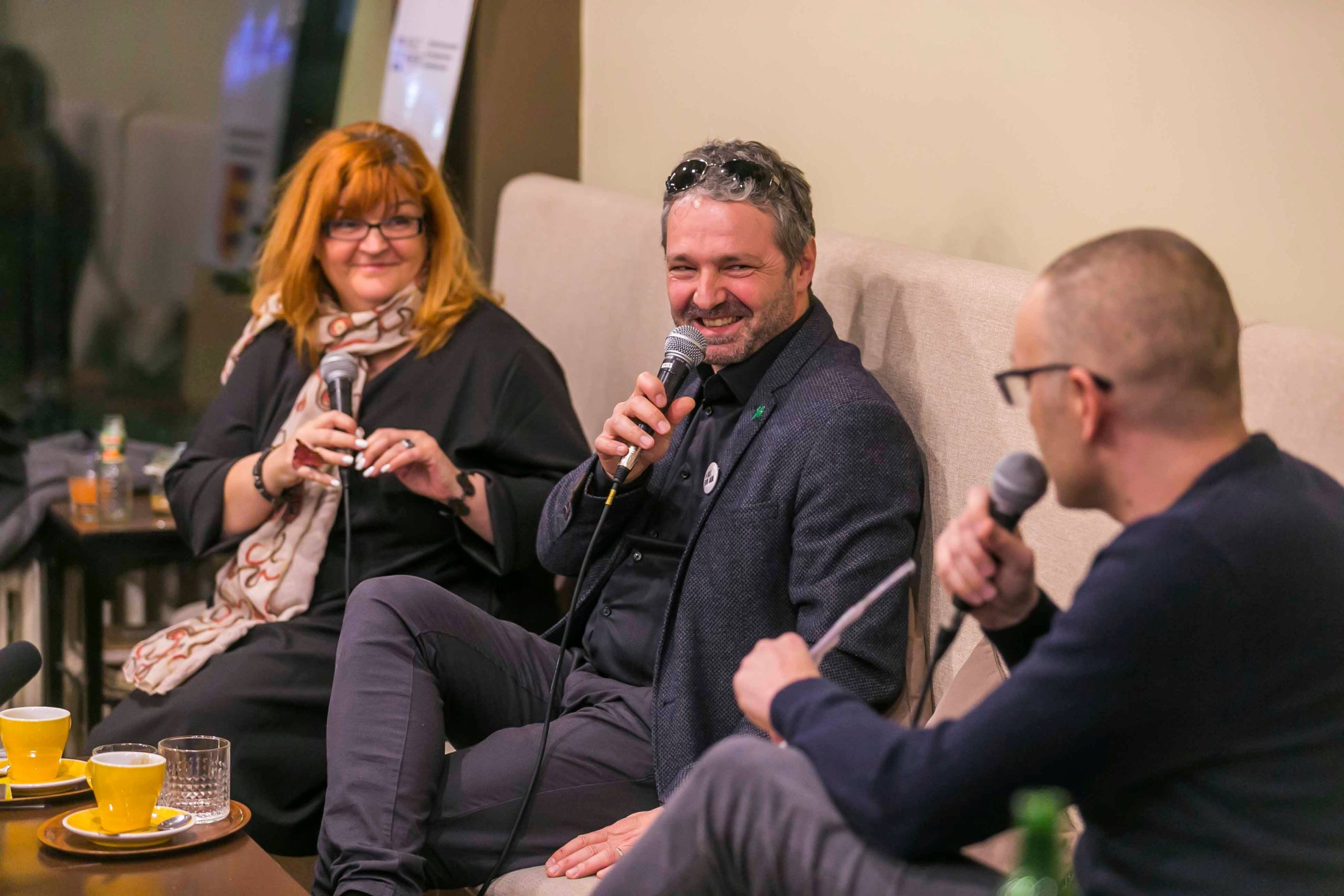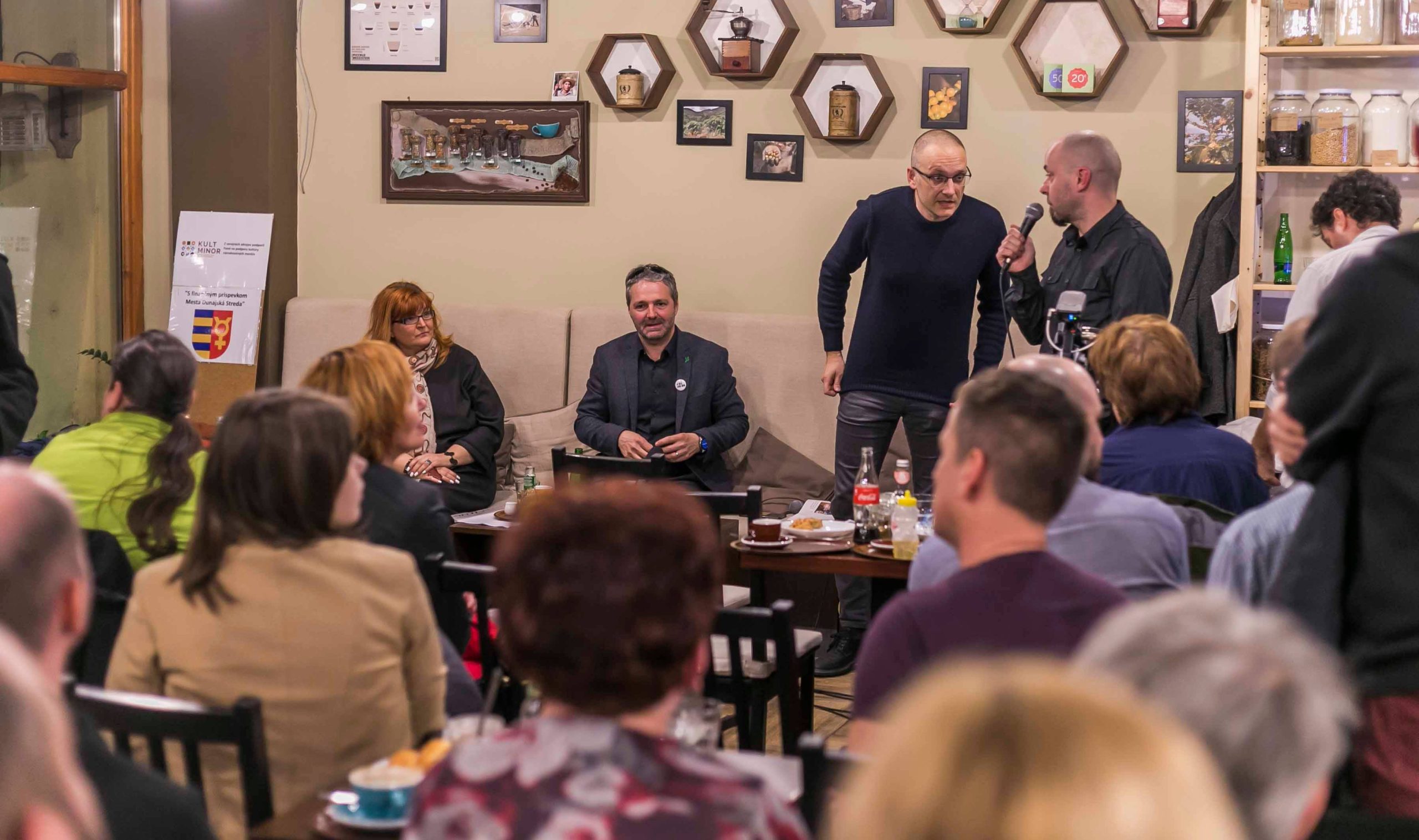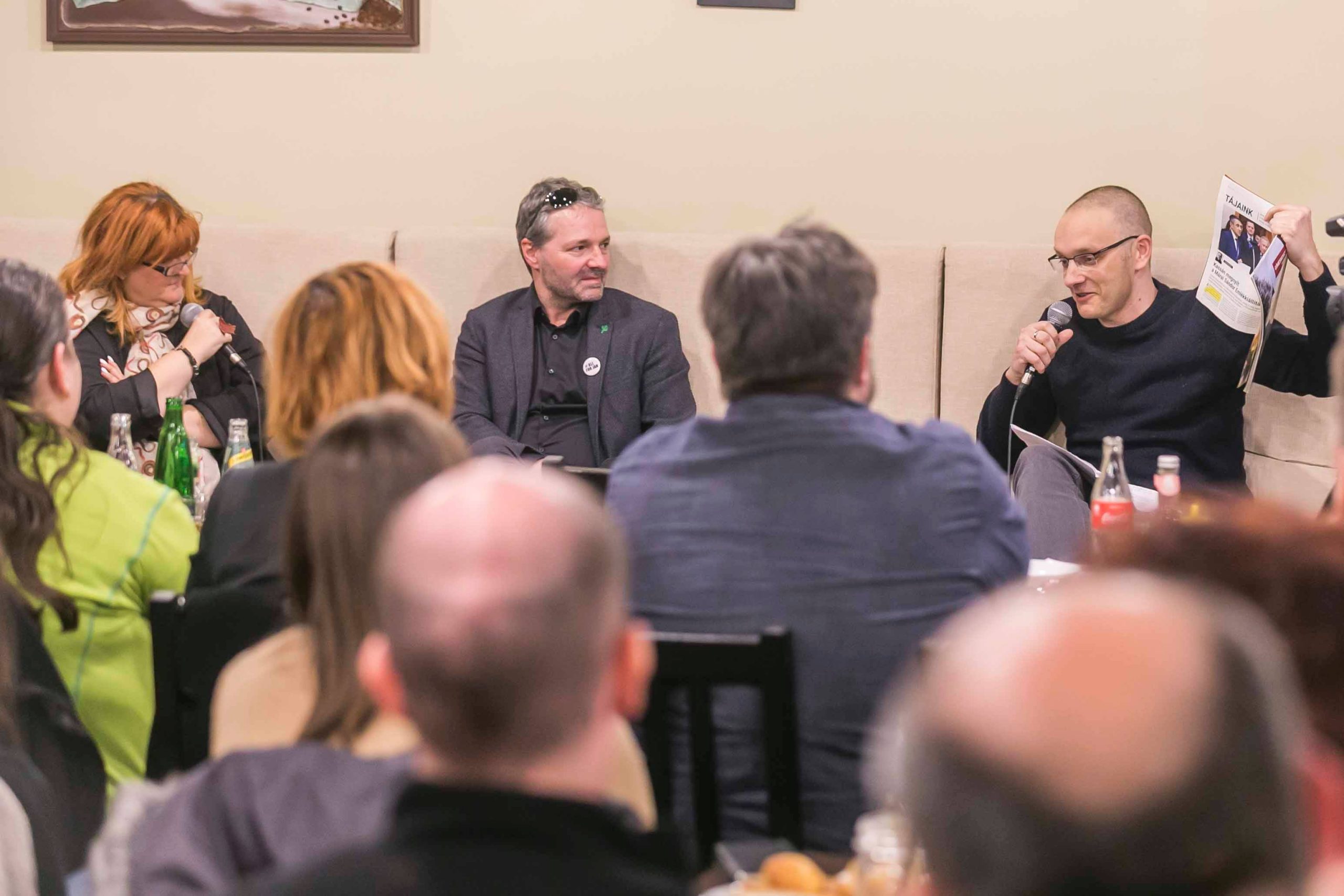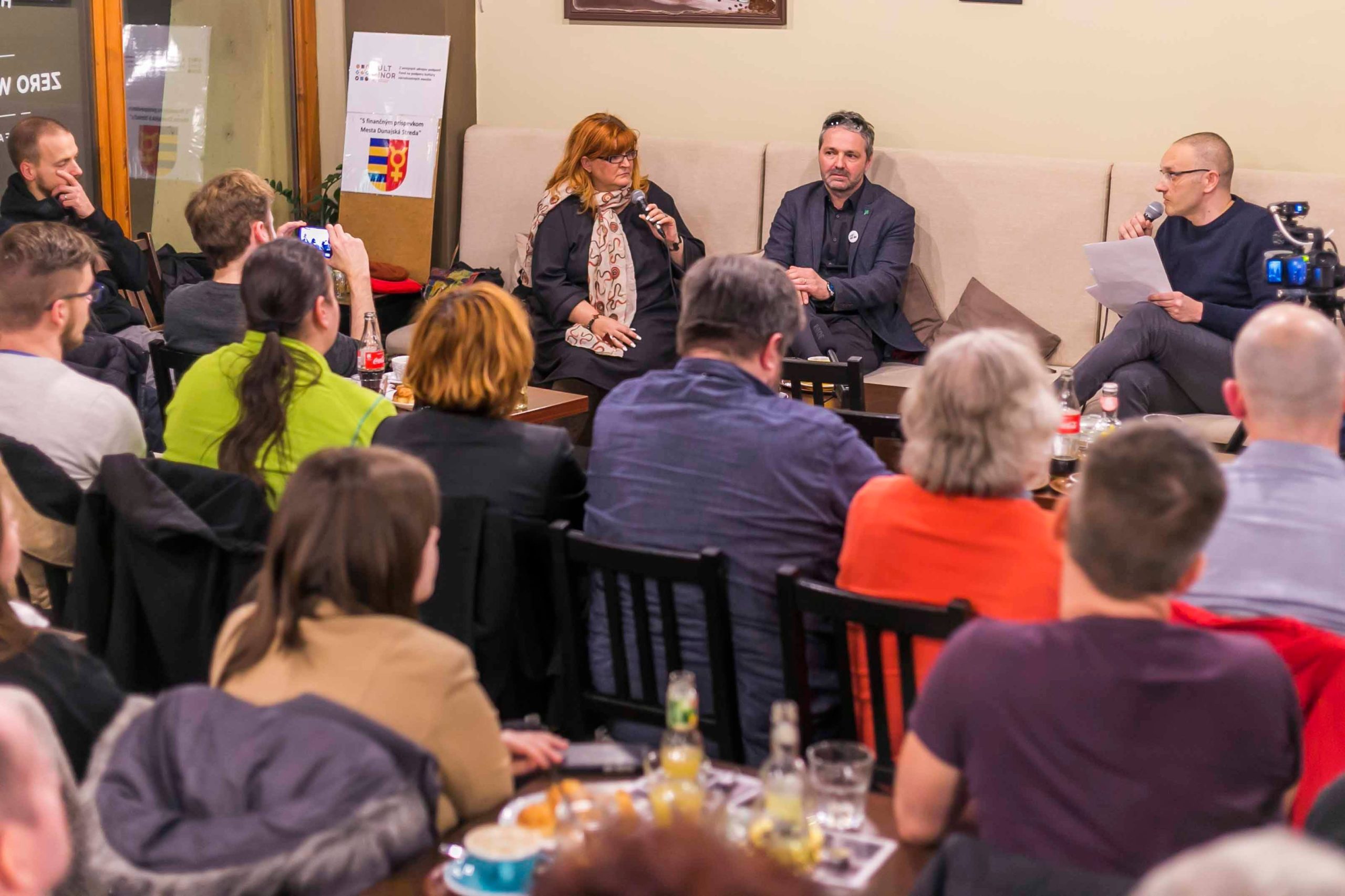Parallel Hungarian Media Spaces in Slovakia
The city centre of Dunajská Streda was quite deserted on the night of 21 February, though it is not an uncommon sight in any Slovak town at that time of the year. It seemed that nothing in particular was happening around the lonely and rain-soaked streets, until one found its way to the crowded and lively Buena Coffee House, its well-lit interior a striking contrast to the silent town, where everyone in the audience was paying attention to an ongoing discussion.
Who says the truth? – it was the simple but provocative title of the debate organised by the online cultural magazine, Dunszt. At first sight, it might have seemed to be the confrontation of the “conservative” and “liberal” media products, but as the organiser and the editor-in-chief of Dunszt, Zsolt Beke summarised it in his opening thoughts, there were a lot of questions to be answered – for example, how the Hungarian media in Slovakia can contribute to the transforming Slovak media culture after the Kuciak murder. All eyes focussed on the three protagonists – Judit Molnár, editor-in-chief of the Ma7 media group; János Lajos P., editor-in-chief of Új Szó; and József Gazdag, journalist, the moderator of the evening.
The Kuciak Murder
Few would have thought at the beginning of the debate that the least controversial topic of the evening will be the Kuciak murder. József Gazdag first asked the participants to reflect on the passivity of the Hungarian-majority towns in the southern part of the country, while there were huge demonstrations all over Slovakia to commemorate the first anniversary of the murder of one of Aktuality‘s journalist, Jan Kuciak, and his fiancée. Judit Molnár explained the phenomenon with ethnic differences:
“The indifference of Hungarians in Upper Hungary – and it is not the only Slovak issue they show disinterest in – might be some kind of response to the general indifference of the Slovak majority towards the disrespectful treatment of the Hungarian minority, as if we wouldn’t be part of the country.”
János Lajos P. provided a simpler explanation that entirely dismissed the idea of ethnic tensions:
“The civil society might not be as woke as we suppose or maybe they don’t have good relationship with the organisers.”
Even at this point, the responses reflected the different aspects the journalists and, by extension, the media they spoke for, represented. While Ma7 put emphasis on national ideologies and their representatives, Új Szó offered brisker and, to an extent, more flippant insights.
Bosses and conspirations
Gazdag already early in the night showed signs that he will not sugarcoat his role as the moderator. He posed provocative questions supported by ample background information, and the two editors-in-chief started to feel more and more uncomfortable. János Lajos P. received the first heavier question when he was asked about the Penta financial group, the owner of Új Szó. Jaroslav Haščák, one of the board members of Penta, was mentioned in the statement of Alena Zsuzsová as one of those who ordered the murder of Kuciak; Gazdag wished to know how it felt to find the name of his “actual boss” in such context.
“Awful. What more can I say?”, replied immediately Lajos P., then he quickly added that “there was no pressure from the owner Haščák, nor from Martin Danko, neither from the company”. (Martin Danko is responsible for the foreign relations of Penta.) He upheld his opinion even when Gazdag mentioned Pluska.sk, where it had been proven that Penta directly influenced the editing policy of the newspaper.
Gazdag then turned to Judit Molnár posing a question about the demonstrations following the crisis of the Fico- and Pellegrini-governments. She was asked whether she agreed with Viktor Orbán and László Kövér when they had said that the demonstrations are supported by George Soros. The provocative edge of the question was clear as the editor-in-chief of Ma7 had previously proclaimed her satisfaction for the fall of the Fico-government, and thus – in case the Hungarian prime minister was right – she would have seemed to agree with the machinations of George Soros. Molnár, however, failed to resolve this clash of principles, and backtracked with answering that she didn’t know who might have been behind the demonstrations, but she didn’t excluded the influence of Soros, as the demonstrations had been initiated by high school students who definitely had not had the sufficient means to organise such an event.
In dire opposition
“Isn’t it a terrible waste to give up on readers in a relatively small community?”, arrived the next savage question from Gazdag, referring to the rather selective editing policies of the two newspapers. He then listed some of the titles and topics that can be accessed on their online platforms. Molnár opted for a more balanced opinion saying that they both discussed the same news items, only their presentation and evaluation were different. Nevertheless, the two editors-in-chief still managed to clash (after disagreeing on whether the Fico government had really been overthrown, and to what extent it could be considered as a failure), following Lajos P.’s innocent apology which was immediately retorted by Molnár, and the audience burst into laughter.
Lajos P.: “I have to admit that I don’t often read Ma7… No offence, I simply don’t have the time for it.”
Molnár: “I also cancelled my subscription for Új Szó…”
Gazdag: “Love is in the air…”
Gazdag, however, put a twist into the discussion when he asked the journalists to describe the media product of the other party. Judit Molnár first remarked that how Lajos P. would be able accomplish the task when he didn’t read Ma7, then dwelt at length on the documentary value of printed media as opposed to online platforms, shortly mentioned the selective editorial practices of Új Szó, and, finally, she praised the Fidesz government and defended its results. “It’s pretty hard to write history from the internet. Of course, it’s easy to find something, but it will never write history. If we write the world on the internet… it’s like writing it into dust, as I often say. Paper is long-lasting… and for a long while, only Új Szó was the only opinion. […] The everyday happiness and challenges of the average Hungarian in Upper Hungary: the opening of a new nursery or primary school, the funding of their small enterprises – they also part of the bigger picture but as they are facilitated by the Hungarian government, they are not written about in Új Szó, because of the exact reason that it was funded by the Hungarian government.”
János Lajos P. was not really concerned by the criticism of his partner, he only added some basic criticism about Ma7. “I wish it had a critical edge. We often write negatively about the Slovak government, but we also admit if they do something correctly. That’s the situation with the Hungarian government as well. What I miss from Ma7 is exactly this unbiased attitude towards Hungarian politics.”
Takeover
József Gazdag, of course, had to mention the supposed or real connections between the editor-in-chief of Új Szó and the political party Híd, namely that Lajos P.’s wife, Andrea Perhács is a long-time assistant of László Solymos, one of the leading politicians of the party; in addition to that, she operates a publishing house with Petra Džerengova where János Lajos P. is named as the manager in the registry. Lajos P. downright denied everything, and he attempted to divide editing policies and private interests: “Everybody has a wife, a father, brothers and sisters, and they have to work somewhere […] If you can highlight instances from our newspaper where we might have given preferences to Sólyom, where he is more often cited than other politicians or he is included in our articles without any reason, then I’m ready to hear about it, but, as far as I know, there isn’t anything like this.”
Gazdag didn’t leave it at that, and he cited the infamous article of Zsolt Gál that had not been published in Új Szó as it had referred to the personal changes in the editorial staff over the course of Spring 2018 as “the takeover of Híd”: András Nagy – who had indeed had connections with the party – was employed without the knowledge of the then-editor-in-chief, Zoltán Szalay, who had later been dismissed. The current editor-in-chief denied these allegations, and as a political counterargument, he remarked that Zsolt Gál had since become one of the founders of Magyar Fórum, a new political party – Zsolt Simon, former member of Híd was also member of this party, so Gál couldn’t have provided a neutral point of view.
MKP, Fidesz and some harsh comments
Once the connection between Új Szó and Hid had been analysed, the relationship between Ma7, MKP (Party of the Hungarian Community) and Fidesz was put under scrutiny, as, for example, the media group had received a subsidy of 1.5 million euros from the Hungarian government. Molnár seemingly kept some distance from MKP (“Why would it be MKP’s newspaper, even if we represent more or less the same values”), but there was an unconcealed, stronger affinity towards Fidesz (“I hope everyone can find a patron and a supporter as great as the Hungarian government to us.”)
That was the beginning of the toughest moments for Judit Molnár. Gazdag cited a few articles from Ma7, then an editorial written by Károly Kövesdi in which the author labels as “harmful creeps” those “age-old reformed communists and neo-liberals” who “strive for the downfall of Europe”. When Gazdag asked his merciless question, Molnár supported his colleague wholeheartedly:
Gazdag: “What would you call it when someone labels those with other opinions as harmful creeps? National conservative ideology? Outstanding journalism? Or at least fair journalism?”
Molnár: “All of the above, in this order. There is only one problem with the article: it wasn’t written by me.”
Gazdag: “But, as the editor-in-chief, you take the responsibility…”
“Molnár: “Yes, I take the responsibility for this article for I think similarly. Maybe I wouldn’t have used this expression. Everybody knows that Karcsi sometimes uses harsh words. This is a harsh idea, a harsh comment. Sometimes you have to do this to have impact on the readers, to let them know that what happens right now in Europe is the beginning of the end.”
At this point, some members of the audience left the café, while others accused the editor-in-chief of racism, but she repudiated it. József Gazdag then thoroughly explained that such word use is parallel to the extreme language of the Hungarian journalists in the 1930s and mentioned the Rwandan genocide as well, but Molnár brushed these examples aside. There were more than enough lengthy pauses between questions and answers, until Gazdag had to ask what Kövesdi might have meant with one of the most unsettling thoughts of the article, namely, when he says that Europe can only find its way back “without these harmful creeps”. Molnár said that she didn’t know what the author might have wanted to say but insisted that the article was free of extreme thoughts.
Censorship or editorial autonomy?
Following this debate, József Gazdag simply asked whether Új Szó is under censorship. János Lajos P. answered with a no, but he supposedly knew that Gazdag had an ace up in his sleeve. And he did play his trump, referring to the instance when allegedly an article written by Pál Szombathy hadn’t been published because it had criticised the Hungarian opposition. Lajos P. admitted that there were not one, but two such articles, but he explained away his decision as editorial autonomy: “I wouldn’t call it censorship […] I rejected an article about the CEU because I found that it downplayed the problem, and I discussed it with Szombathy that it wouldn’t fit into the profile of the newspaper as I considered the expulsion of the CEU a clear-cut issue.”
Hungarian identity and history
The front page of the 20 August 2018 edition of Új Szó suggested that the editors hadn’t taken the State Foundation Day seriously, and József Gazdag didn’t avoid the obvious question whether the newspaper found it important to strengthen the Hungarian identity. The abovementioned front page was the main focus of the question, even though Gazdag listed some other examples, e.g., when Új Szó failed to cover the Duna Menti Tavasz, a national festival for Hungarian theatrical and puppetry student groups – the lead article on the culture page was about George Michael. János Lajos P. said that their reports highlight several important Hungarian events and topics, like 15 March or sports results, but he found State Foundation Day and the image of Saint Stephen less significant. “Maybe it’s a mistake, maybe I’m too liberal and I don’t think it’s important to write about a king who lived a thousand years ago… Well, he is important for the Hungarian identity as he founded the state… but, the problem is that the holiday has been overshadowed by politics.”
Judit Molnár wanted to react immediately to the topic that lead to another small debate, but Lajos P. succeeded to find a smart retort reflecting on Petőfi’s political stance:
Molnár: “This is a telling difference between us. He says that a king was born a thousand years ago, while I say that our king was born a thousand and some years ago who founded our country. This is the difference between conservatives and liberals.”
Lajos P.: “I don’t know what Petőfi would have done if he would have been forced to put Saint Stephen on the front page of his newspaper. He probably wouldn’t have been fond of the idea.
Molnár: “Yes, he would have pretty much disagreed, but I think he wouldn’t have dismissed the importance of Saint Stephen.
Gazdag continued with the issue of identity in relation to party politics, bringing up several articles from Ma7 where the presence of images of Viktor Orbán, János Áder or Árpád János Pótai had been unnecessary or unjustified, giving him the impression that the newspaper “wants to satisfy not just its readers but the Hungarian government as well”. Molnár repeated that she wished everyone could find a patron like the Hungarian government, and – like Lajos P. did when questioned about Penta – downright rejected even the possibility that they have to obey to any kind of pressure or order coming from Budapest, and added that she didn’t find superfluous the inclusion of the politicians’ pictures.
Does a Hungarian journalist in Slovakia investigate?
After a few more questions about Fidesz-influenced Hungarian media, if there is any solidarity among them and whether they close down or forced to close down, József Gazdag entered upon a highly professional topic that is one of the most defining feature of the Hungarian public space in Slovakia: investigative journalism, or, rather, the lack of thereof.
“Why can we only be informed about the shady affairs of the Hungarian elite in Slovakia from Slovak newspapers, like Denník N or Aktuality?”. The question was aimed at both editors-in-chief.
Lajos P. cited the lack of funds as the main reason why there were no comprehensive investigative articles, and he added that the only solution might be if they join to either Slovak (e.g., the Jan Kuciak Investigative Centre, Aktuality, Denník N) or Hungarian (Átlátszó, Direkt36) initiatives. The response seemed to echo the general idea that the institutions of the Hungarian minority (everywhere in the Carpathian Basin) is underfunded, and they have to rely on other institutions. Judit Molnár contradicted to an extent and brought up several Ma7 projects which, according to her, could be considered investigative pieces; they had written about Zsolt Simon’s or Gábor Gál’s affairs, and the latter allegedly even threatened them.
Considering the general landscape of the Hungarian media in and around Hungary, it is difficult to organise a debate like this. The differences between people and groups run too deep, and neither the political forces who proudly proclaim their Hungarian identity nor the average citizen does anything to lighten this hostile atmosphere. There are places, for example in Vojvodina, where a debate to contemplate on their profession, their workplace, and the society they live in between the editors-in-chief of two mediums with such conflicting values like Ma7 and Új Szó would be unimaginable– even if reconciliation is by default out of option. It might have been easier for both Judit Molnár and János Lajos P. to decline the invitation, too, but they finally decided to go along with it.
It might not be a stretch to say that for the years and decades to come, the sensitive topics, the arguments and counterarguments of this evening will provide a perfect snapshot about the state of the Hungarian journalism in Slovakia around 2019.
(Despite the length of the article, it is just an extract of the topics discussed over the course of the evening. You can watch the full debate here.)
Ha tetszik, amit csinálunk, kérünk, szállj be a finanszírozásunkba, akár csak havi pár euróval!

